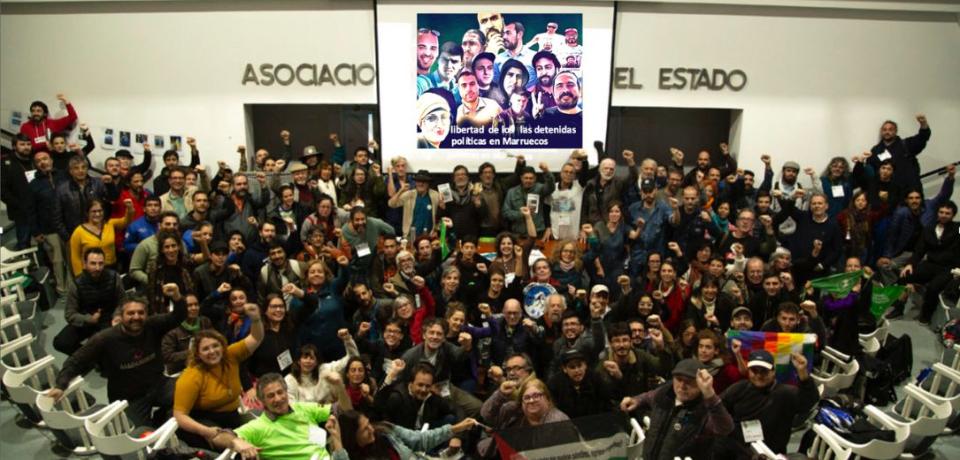
The Sixth International Ecosocialist Conference was held on 10-11 May 2024. This was the first time outside Europe, a decade on from the first meeting in Geneva (Switzerland) in 2014. The project began more than a year ago, when ATTAC and the Argentine socialist movement Poder Popular were contacted to explore the possibility of organizing it. After months of debate, the context of harsh Argentine realities, together with the electoral situation, led us to suspend the holding of the event in 2023, but the work and setting of political goals continued.
Successive meetings of the group promoting the Conference, includin organizations from Brazil, Chile, the Basque Country, Portugal and Switzerland, were augmented with a series of international meetings, where the Marabunta organization joined the local Argentine group. After the elections and with the victory of Javier Milei, it was decided to continue holding the Conference in the month of May. This was ratified immediately after the victory of the libertarian candidate, in view of his program of structural adjustment of capitalism against the working class, since international solidarity is key to defeating the plans of this figure.
SOME OBJECTIVES OF THE MEETING
The environmental movement in Argentina is broad, diverse and with many activists. The anti-extractivist struggles, as well as those against the expansion of genetically modified crops and against the use of agro toxins, make it one of the most dynamic sectors with a great appeal among youth. However, the ecosocialist perspective is not a voice of great relevance. This diagnosis positioned the Conference as a platform to bring together all the activism that draws on this perspective. On the other hand, the dynamics of the Meeting meant that it takes place only every two years.
The challenge was to give it some political and activist continuity, which consolidated debates and could advance to greater levels of agreement and programmatic and strategic developments at the level of the challenge posed by the climate crisis, the responsibility of the capitalist productive regime. Likewise, its being held in the South posed the challenge of touching on topics that are not common in other latitudes, such as extractivist debates, as well as green colonialism or the problems surrounding environmental racism and the struggles of indigenous peoples.
Finally, the holding of COP 30 in Belem in 2025 imposed a new debate around this conference, the usefulness of participating, the strategy of denunciation and ignorance or participation in the counter-summit that is already taking place.
THE DEVELOPMENT OF THE CONFERENCE
After almost a year of work, on 10-11 May, more than 200 people met at the Central Auditorium of ATE (State Workers Association) and the two auditoriums of the Quagliaro Hotel, also owned by the aforementioned union. On 9 May, Conference activities were planned, but they were suspended due to the necessary general strike called that day by all the country’s trade union federations responding to the strong adjustment imposed by the government of Javier Milei. Over both days, various topics on the ecosocialist agenda were covered, starting with the history of the Conferences themselves, knowing that every struggle must have its memory, so as not to have to start from scratch again.
The problems of Eco-Marxism, the plundering of territories, debt and trade in an eco-socialist key, the rise of militarism and the extreme right and repression were some of the topics of the first day, which closed with a panel that represented the big environmental struggles that have occurred in Argentina in recent decades.
Saturday the 11th began with an intervention by Michael Lowy in the ecosocialist debate between the centre and the periphery, followed by an in-depth debate on what to do in the face of COP 30, a space that inaugurated the First Latin American and Caribbean Ecosocial Conference. Food sovereignty, ecofeminism and the debate on energy and class in capitalism animated an afternoon where each topic was explored in depth. The final panel discussed the current situation of the ecosocialist movement and its future prospects, with one of the leaders of the global ecosocialist movement, Daniel Tanuro participating by video.
The Conference crowned its realization with the promise of a triple continuity: participation in the counter-summit in Belem, holding the Second Latin American and Caribbean Ecosocial (ist) Conference there; the seventh International Ecosocialist Conference in Belgium organized by Gauche Anticapitaliste; and the continuity of the programmatic, strategic debate in an international network that will hold its first meeting in the next few weeks.
SOME CONCLUSIONS
I consider that the Sixth Conference was a success. With the participation of more than 40 organizations and more than 15 countries, as well as a large part of the Argentine provinces, the ecosocialist movement has a milestone from which to intervene in a better way in the environmental movement. The ecosocialist challenge now lies in giving continuity to the organization of its own permanent instances of reflection and construction, as well as intervening in a unitary way in the fight against the extreme right-wing deniers of the climate crisis while always being careful not to fall into the false solutions of green capitalism.
Today we are closer to a systemic ecosocialist alternative that allows the working class to enjoy a healthy environment, fewer hours of work and more time for collective enjoyment. It is time to go on the offensive and articulate a systemic program against the climatic and social barbarity of capitalism.
20 May 2024